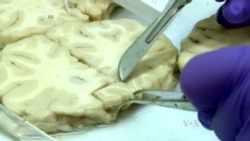Scientists have been studying the effect of explosions on soldiers’ brains since World War I. Some military veterans who survived powerful explosions may become violent or experience depression. It may be difficult for the former soldiers to concentrate on what they are doing. Their feelings may change quickly -- from happy to sad or even angry.
Now, researchers have found that the soldiers’ brains suffered physical damage, like people who die in transportation accidents or from a drug overdose.
Researchers at the Johns Hopkins School of Medicine examined the brains of former soldiers who had died. These veterans had been injured in a battlefield explosion, but it was not what caused their death.
The researchers discovered evidence that nerve fibers in the front of the brain had been damaged. Professor Vassili Koliatsos led the study. He says the discovery explains why the veterans had a condition known as ‘shell shock.’
“And that’s very important because this is the site – this is the center of the executive functions of the brain, functions that allow you to put your life together, organize, plan ahead, understand, abstract. And you can imagine that this can make your life difficult.”
Professor Koliatsos says the physical damage was often found near blood vessels inside the skull. He says this suggests that the force of the explosion pushed blood from the chest into the brain. This caused the brain to quickly swell or become enlarged. He says when the brain swells, it pushes against the skull.
The professor says that, as a result of the study’s findings, doctors may decide to give different medicines to veterans suffering from post-traumatic stress disorder. And he says the findings may cause military officials to find ways to better-protect a soldier’s chest.
I’m Bob Doughty.
VOA’s George Putic reported on this story from Washington. Christopher Jones-Cruise adapted it for Learning English. George Grow was the editor.
_____________________________________________________________
Words in This Story
concentrate – v. to think about something; to give your attention to the thing you are doing or reading
overdose – n. an amount of a drug or medicine that is too much and usually dangerous
executive functions – n. also known as cognitive control; the management memory, reasoning, task flexibility and problem solving, as well as planning and execution.
abstract – v. to deal with general ideas or qualities rather than specific people, objects or actions
skull – n. the bony structure that forms the head
swell – v. to become larger than normal; to enlarge
How do doctors in your country care for veterans who have suffered brain injuries on the battlefield? We want to hear from you. Write your thoughts in the comments section.





